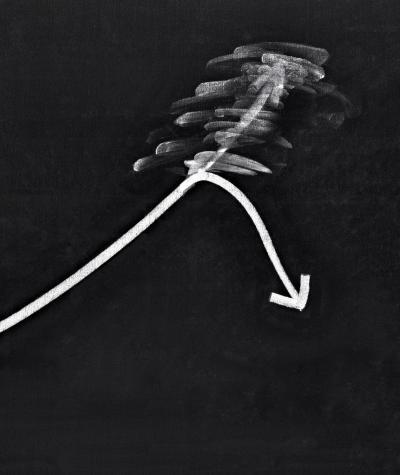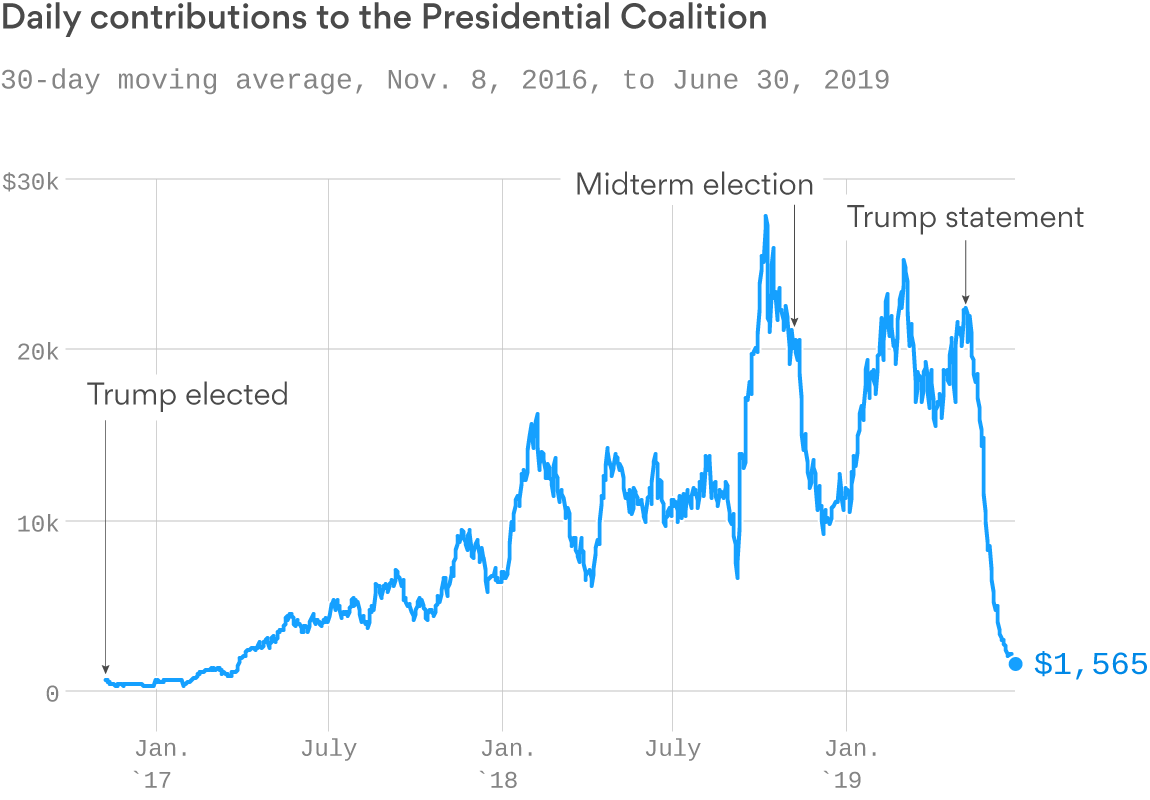Earlier this year, a joint investigation by Campaign Legal Center (CLC) and Axios documented how the Presidential Coalition capitalized on its founder’s ties to President Trump to raise millions of dollars but devoted less than 3% of its spending to political activities. The investigation prompted a stinging rebuke from President Trump’s campaign—and, according to new records, led to a precipitous drop in fundraising activity.
After the CLC/Axios investigation and the Trump campaign’s admonition of the Presidential Coalition, the group’s average daily contributions plummeted, from over $20,000 per day in early May to under $2,000 per day by the end of June, according to the Presidential Coalition’s mid-year report filed last month with the Internal Revenue Service (IRS) and jointly analyzed by CLC and Axios:
Data: Presidential Coalition's forms 8872 from the IRS (Chart excludes undated contributions) Chart: Harry Stevens/Axios
These numbers suggest that public exposure of misleading operations like the Presidential Coalition’s can have an impact.
The initial CLC/Axios investigation revealed that the Presidential Coalition, led by former Trump deputy campaign manager David Bossie, saw a jolt in fundraising after the 2016 elections from its small-dollar and retired donor base—some of whom thought they were sending money to support Trump directly—but that the group plowed most of the funds raised back into more fundraising, payments to other groups affiliated with Bossie, purchases of Bossie’s own books, and administrative costs.
Two days after the investigation was published, the Trump campaign issued a statement denouncing “dishonest fund-raising groups” that “deceptively use[] the president’s name, likeness, trademarks or branding and confuse[] voters.” The statement didn’t mention the Presidential Coalition by name, but it was widely reported that Bossie and his group were the target. Other reports that week indicated that Bossie was pushed out of Trump’s inner circle. Bossie told Axios that the night that the campaign issued that statement, Bossie halted the Presidential Coalition’s fundraising solicitations.
Covering activity from January through the end of June 2019, the Presidential Coalition’s new IRS report demonstrates the fallout from the CLC/Axios investigation and subsequent presidential condemnation.
At the same time, this story underscores the need for systemic reforms, which could begin to rein in the growing industry of groups that are engaged in similarly deceptive political fundraising practices but that might be less likely to attract public scrutiny.
A Decline in Fundraising and a Rising Wave of Pro-Trump Ads
In the first half of 2019, the majority—62%, or $4.5 million—of the Presidential Coalition’s $7.2 million raised continued to come from unitemized, small donors who gave under $200 in a year, according to the group’s mid-year IRS report analyzed by CLC and Axios. The dates of those small-dollar donations are not known, because the IRS only requires Presidential Coalition to provide that information for donors who give over $200. But the data from those who did give over $200—and whose information the Presidential Coalition itemized, per IRS requirements—suggest a steep decline in the final third of the reporting period. Only 11% of the group’s itemized contributions in the first half of 2019 came in between May 5 and June 30, despite that accounting for nearly a third of the reporting period.
The IRS report also suggests that Bossie’s Presidential Coalition may have sought to get back into the President’s good graces with a wave of pro-Trump digital ads.
In June, the Presidential Coalition reported spending $325,000 on “digital ad buys,” which appears to correspond to a pro-Trump digital ad campaign the group subsequently announced in July. According to a Presidential Coalition press release, the ad campaign “highlight[ed] President Trump’s pro-growth agenda” with messages tailored to Michigan, Pennsylvania, and Wisconsin. Facebook’s political ad archive shows that the pro-Trump ads did run in those presidential swing states, as well as a handful of other states. The “Learn More” links in the ads then directed traffic back to the Presidential Coalition’s website, where visitors were encouraged to sign up for the Presidential Coalition’s email list and donate.
The Presidential Campaign continues to say that its mission is to “support the conservative farm team” by focusing on state and local elections—a claim that also appeared throughout the fundraising mailers the Presidential Coalition was sending potential donors—but these digital ads were exclusively focused on public praise of the President.
Paying More to the Postal Service Than It Made in Political Contributions
In many other respects, the Presidential Coalition’s essential mode of operation remained consistent through the first half of 2019.
The Presidential Coalition has spent $5.9 million this year, but it has continued to devote only a very small proportion of its overall spending to political contributions to state and local candidates, even after accounting for an upsurge in political giving following the CLC/Axios report. In the first half of 2019, the Presidential Coalition devoted only $148,100, or 2.5%, of its overall spending to political contributions—contributions that it still touts on its website as evidence of its “[i]mpact.” 97% of those contributions were made in May and June, after the CLC/Axios exposé published.
To be sure, groups can support political candidates in ways beyond direct contributions. But had the Presidential Coalition run broadcast ads mentioning candidates—say, in states’ Republican primaries this spring—it would have typically needed to report those to federal or state authorities, as it did in Virginia’s 2017 gubernatorial race. To date this year, neither federal records maintained by the Federal Communications Commission nor state records aggregated by the National Institute for Money in Politics and the Campaign Finance Institute show any evidence of the Presidential Coalition running reportable political broadcast ads. And the Facebook political ad archive doesn’t show any ads supporting state candidates, either.
The only other evidence of political activity in the Presidential Coalition’s mid-year report was the $325,000 payment for digital ads praising Trump. Together, that payment and the $148,100 in political contributions still made up only 8% of the group’s six-month spending.
The remainder of the Presidential Coalition’s expenditures so far this year have again included significant outlays for direct mail fundraising. For example, it paid:
- $628,873 to direct mail firm RST Marketing;
- $617,811 to direct mail firm Planet Direct Mail;
- $422,150 to envelope and packing manufacturer SupremeX;
- $415,971 to HSP Direct, a direct fundraising company focused on direct mail services;
- $393,855 to direct mail firm MDI Imaging and Mail;
- $356,407 to direct mail and shipping firm Fulfillment House;
- $308,328 to direct mail firm BigEye Direct; and
- $243,605 to the US Postal Office.
Each of those entities on its own received more than the Presidential Coalition spent in the entire six-month period on all of its direct political contributions ($148,100).
The Presidential Coalition also continued to pay the telemarketing firm InfoCision, which is known for its predatory tactics and self-enriching payment arrangements; the Presidential Coalition paid at least $170,082 to InfoCision and its affiliates in the first half of the year, including after the Axios story and CLC report published in May. And it continued paying large amounts for donor list cultivation, including $447,549 to Nova List, Sunrise Data Services, and DonorBureau for those services.
As in previous years, the Presidential Coalition continued purchasing and shipping books, including Bossie’s own. (According to mailers previously obtained by Axios, a recurring element of the group’s fundraising mailers was an offer of a book gift to donors who gave certain amounts.) In addition to payments to mailing and shipping firms above, some of which likely included payments for book shipping and delivery, the Presidential Coalition reported direct payments of $8,460 to Books-A-Million for Bossie’s Let Trump be Trump and $8,130 to The Dunham Group for purchase and shipping of Bossie’s Ronald Reagan, Rendezvous With Destiny. It also reported paying $25,668 to Books-A-Million for Newt Gingrich’s Trump’s America.
Other expenditures in the first half of 2019 have included another $350,806 in rent, utilities, and payroll payments to Citizens United and Citizens United Foundation, which Bossie also runs and receives salaries from, and $19,808 in legal fees, newly incurred in June.
Public Scrutiny Can Have an Impact—But Broader Reforms Are Necessary
The latest chapter in the story of the Presidential Coalition illustrates the effect that heightened public scrutiny can have on a deceptive political operation—of which the Presidential Coalition is only one of many.
So-called “scam PACs” are a growing problem that produce examples like the recently-exposed Conservative Majority Fund, which displayed a strikingly similar fact pattern to the Presidential Coalition’s in its tactics, donor pool, payments to firms like InfoCision, and largely unrealized promises of political activity.
But in important ways, the Presidential Coalition is unique. The group raised millions by capitalizing on Bossie’s ties to the President—which attracted the attention of CLC and Axios, and which triggered a presidential backlash, followed by an apparent shift in tactics. But most scam PACs fly under the radar without attracting national attention or an official rebuke from a sitting president’s campaign.
Sunlight can be an important scam PAC disinfectant—and may have worked here—but the scope of the scam PAC problem makes broader reforms necessary.
Congress could limit or require disclosure of self-dealing by political groups registered with the IRS like the Presidential Coalition, and it could do the same with those registered as political committees with the Federal Election Commission (FEC). Congress could also extend the ban on the “personal use” of campaign funds to all federal political committees. At the state level, state attorneys general offices and other state enforcement authorities could crack down on fundraising practices that mislead state residents and could scrutinize groups that abuse their tax-exempt statuses. These measures would bring greater accountability to scam PACs and deter new ones from springing up in the first place.
Groups like the Presidential Coalition can deceive vulnerable voters, underwrite self-enrichment schemes, and divert resources away from more effective political operations. Shining a spotlight on such groups is important. And so is foreclosing the paths for their abuses in the first place.

